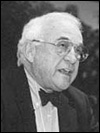By Phil Meyer
Most of the things that I needed to know for my Twentieth Century journalism career I learned in high school, and they are still useful today: Touch typing, writing a simple declarative sentence, respect for scientific method and the Bill of Rights. My school was too small to offer a photography course, so I taught myself out of a library book and by helping a teacher shoot group photos for the yearbook with a pre-Anniversary Speed Graphic.
 Scholar, researcher and teacher Philip Meyer is the Knight Chair in Journalism in the School of Journalism and Mass Communication at the University of North Carolina at Chapel Hill.
Scholar, researcher and teacher Philip Meyer is the Knight Chair in Journalism in the School of Journalism and Mass Communication at the University of North Carolina at Chapel Hill.
His 1973 book, “Precision Journalism,” was listed by Journalism Quarterly as one of 35 significant books of the 20th Century on journalism and mass communication. The fourth edition was published in 2002. His most recent book is “The Vanishing Newspaper: Saving Journalism in the Information Age,” published in 2004.
In 1967, Meyer was detached from the Knight Ridder Washington Bureau to the Detroit Free Press to report on the Detroit riot. His application of social science research methods, learned in Harvard’s Nieman Fellowship program, helped the staff win the Pulitzer Prize for general local reporting.
Knight Ridder later moved him to corporate headquarters to apply those methods to newspaper marketing and the development of an early electronic information service called Viewtron. His 1985 book, “The Newspaper Survival Book,” is based on that work.
Scientific method and the Bill of Rights are, of course, eternal. The technology of communication is not. My self-taught darkroom skills are obsolete today, although touch typing and shooting pictures (knowing when to push the button) are still important. Meanwhile, the digital age has brought forth a cornucopia of new tools. Trying to teach journalism is frustrating when neither faculty nor students can predict which of the new technical tools will be useful, what kind of specialists will be needed to use them, and how those specialties will be managed.
And yet, management skills might be the key to the future. As technology begets specialization, we will need skilled managers to direct the output of all those specialized tasks toward a coherent whole. The old adage, “A good reporter is good anywhere,” is no longer so convincing. We need good reporters who can bring appropriate tools to bear on constantly changing situations. In this environment, journalists who can do more than one thing well will be in demand. Economics and deadline pressures will ensure it.
Mark Briggs is the assistant managing editor for interactive news at the Tacoma News Tribune. In that job, he can see the problem up close. Although he holds two journalism degrees, the most recent in 2000, he had to educate himself to use the current tools of digital media. He quickly saw that his job would be easier if more of the paper’s staff had workable knowledge of more of the tools.
And so he wrote this book. You can use it like a cookbook. There are recipes, up-to-date, for all kinds of things digital. When I read it, I kept wanting to stop and try something, for instance, setting up an RSS feed, converting my old audio tapes to MP3 files, and changing my default browser to Mozilla Firefox. (There is some irony here, because this volume is a rousing reaffirmation of the book as an information retrieval device. Its content can be accessed in any order, connect time is free, and you can carry it to the coffee shop.)
… journalists who can do more than one thing well will be in demand.
Journalism schools are struggling these days with the issue of how deeply to let students sink into specialties. The gathering consensus is that everyone should know how to do one thing well but be able to work at least in the margins of the other crafts. But as technology and media economics push us toward platform convergence, a new model emerges: The journalist who is a jack of all trades and master of none, a person who can write, shoot, edit, talk, and look good on camera with a competence that might not be great but is good enough. A good reporter would be redefined as one who is good enough in any medium.
If that picture seems too unlikely, we can at least be certain that versatility will be rewarded. And because technology keeps changing, journalism schools might do better if they would focus less on the craft and concentrate on basic theory of mass communication and its effects. Such a concern for first principles might produce more journalists like Mark Briggs, who know how to keep on learning and revising the craft throughout their careers and, as he demonstrates with this volume, help their peers to learn.
